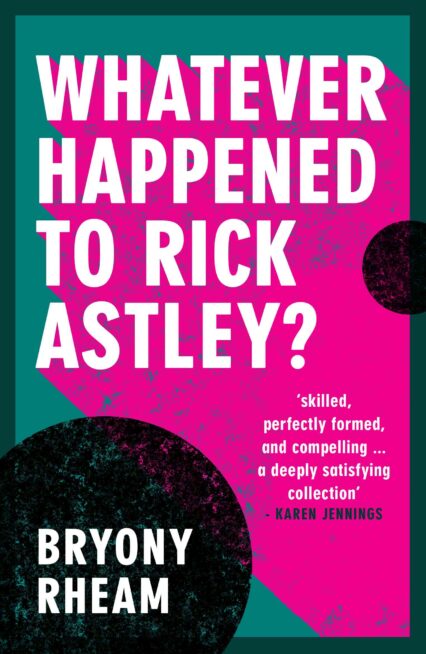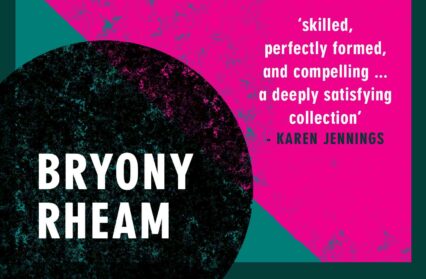In the first of a new series of short stories highlighting the rich history and contemporary work in the form being done by Welsh publishers, we bring you a story from award-winning Zimbabwean writer Bryony Rheam, “Potholes”, whose debut collection of stories, Whatever Happened to Rick Astley? is out now with Parthian Books.

When the Bulawayo City Council stopped mending the roads, Gibson Sibanda took it upon himself to fill the potholes along Napier Road with sand and small stones. At first, his job was a thankless one: hardly anyone stopped to say thank you or toss him a couple of coins. In fact, not many motorists seemed to notice that the holes had been filled in at all. They still tore down the road at great speed, oblivious to him standing on the side of the road, shovel in one hand and cap in the other. When they did notice his presence, they hooted loudly or leant out of car windows to tell him to get off the road before he got himself knocked over, ‘bloody stupid idiot.’
Unperturbed, Gibson carried on his work, every day shovelling another load of sand into the holes and then beating the pile flat with the back of his shovel. When the rains came, Gibson had his work cut out for him. In the mornings, he would fill in the holes, working hard to make sure that he did not create any unnecessary bumps in the road, flattening the sand with the precision of a baker decorating a cake, trimming the icing here and there, smoothing the top and checking from all angles that no imperfections could be seen. Later, he would watch from the shelter of a tree as the rain washed the sand away, but he felt neither frustration nor anger for there was something he enjoyed about the continuous filling and emptying of holes. He never felt it was a waste of time, but rather that it was part of the gentle rhythm of life, a necessity that underpinned its very fabric.
As the other roads deteriorated, a change took place in the behaviour of the motorists. Some stopped to say thank you to him for his work and give him tips and some even asked him to repair other roads. At first, he was quite overwhelmed with the offer of extra work and moved away from Napier to work on its side roads, some of which were barely strips of tar. However, he soon found he disliked the other roads. They were lonely and badly misused: many of them were beyond repair. The edges of the road were rough, dropping away in sudden gullies that made work difficult.
Then he was beset by a much bigger problem. In his absence from Napier, a gang of young boys moved in and took over his spot. The bigger boys crouched in the bushes whilst the two youngest dirtied themselves with dried clay and stood next to Gibson’s neatly filled holes, sticks in hand. As a car approached, they would bend over and pat the holes and then stand back quickly, looking as forlorn as possible, cupped hands outstretched. Initially, Gibson ran up to them, shouting, and they scattered in different directions before regrouping at the top of the road and hurling abuse at him. He picked up a handful of small stones and threw it at them and they ran off laughing. But the next day they were back, and it soon became apparent that he could no longer leave Napier.
One day, early in the morning, Gibson was just walking to his workplace when he noticed a council truck parked up ahead. A gang of workers in blue overalls jumped off and began setting up signs.
‘What is this?’ Gibson asked them. ‘What are you doing?’
‘We’re fixing the road,’ they said. ‘Haven’t you heard? The vice-president has bought a house round the corner. The road must be fixed so he can travel smoothly to and from his home.’
‘But he is never here,’ lamented Gibson. ‘He lives in Harare.’
One of the men stared at him, long and hard, and then laughed and shook his head.
‘There are other roads he could take,’ began Gibson, pointing weakly down Nairn, ‘in much worse condition.’
‘And why would we fix those?’ laughed the man. ‘This one is not too bad. It shouldn’t take us long to finish.’
Gibson watched in horror as the council workers cut a big square around each of his holes and then filled them in with carbon waste from the power station. The man was right; by mid-afternoon they were finished and then they jumped back onto the truck and it clattered away down the road leaving Gibson to survey the damage left behind. The men had made a fire on which to cook isitshwala and boil water for their tea. A hasty clearing that had been made in the grass side of the road was now burnt black. Lumps of cold, hard porridge had been thrown into the bush along with a tin, a couple of torn plastic bags and a scrunched-up piece of newspaper used as a makeshift cloth. Gibson picked up the rubbish and took it to the bin at the end of the road. The bin itself was overflowing with uncollected refuse and Gibson knew that any food would be searched out later that night by the stray dogs of the neighbourhood. Still, he felt the rubbish was in its rightful place and returned to view the rest of the carnage.
He forced himself to look long and hard at the large wounds that had been carved into the soft blue tar. He thought of the gentle circles, how they would no more empty or fill; he thought of the tiny grains of sand and soft small stones, no longer allowed to move and spill, now captured forever, drowning somewhere in the darkness that subsumed them. Bending down, he reached out his hand and gently touched the surface. Perhaps he could remove the black filler; it wasn’t tar after all. But the squares would remain, those squares with their hard, straight sides that looked as though they had been cut with the brutality of a backstreet butcher hacking at a carcass.
Anyone walking or driving along Napier Road at that point might be surprised to see a man crouched by the side of the road, smoothing his hand over the newly mended potholes. They might be even more surprised to see him fall forward suddenly and appear to hug the road as his body racked with sobs. But there was no one around for it was the wrong time of day; when the afternoon, tinged with orange heat, is suspended in time, when every attempt at movement seems countered by the force of eternity that reminds us that our lives are only the tiniest and most insignificant of moments.
Suddenly a car shot down the road, a large black car with shaded windows and no number plate. Gibson rolled to the side. His mouth thrust into the sooty black stones; they pressed painfully into his cheeks and the palm of his hands and his kneecaps. He could taste the smell of sun on the road and the thick, oily effluvium of petrol. Dried grass stuck to his hair. The car belonged to the office of the vice-president; they were checking the road for him as a visit was planned for the following year. Gibson watched as it turned off down the Hillside Road.
The visit never happened. Before the end of the year, the old president and his cronies were deposed. The vice-president went on the run and the house remained closed. The road did not last one rainy season and it was not long before the residents of Hillside were once more complaining. By this time, Gibson Sibanda had moved to a different part of town. He went first to Ilanda and then to Famona and finally settled on Pauling Road in Suburbs. There are many potholes to fill in Bulawayo.
Whatever Happened to Rick Astley? is available now from Parthian Books.

Bryony Rheam was born in Kadoma, Zimbabwe in 1974. She is the author ofThis September Sun, which won best first book award for Zimbabwe in 2010 and was number one on Amazon Kindle in 2013. Her second novel,All Come to Dust, was published in 2020. She has also published a range of short stories in various anthologies. In 2014, she won an international competition to write a chapter of an Agatha Christie novel, the prize being dinner at Agatha Christie’s house. She was a recipient of the 2018 Miles Morland writing scholarship. She is an English teacher at Girls’ College, Bulawayo and lives in the city with her partner, John, and their two children, Siân and Ellie.












